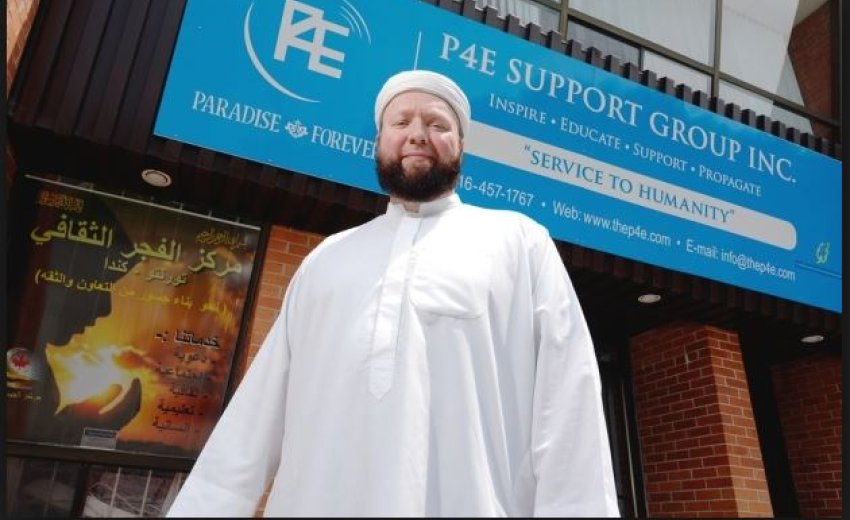 A Toronto mosque is offering a "12-step extremist detox program" for radical Muslims that its director says is the first of its kind in Canada.
A Toronto mosque is offering a "12-step extremist detox program" for radical Muslims that its director says is the first of its kind in Canada.
The Specialized De-radicalization Intervention program is intended to provide "treatment and counselling" to young Muslims sympathetic to the al-Qaeda ideology.
The Muslim leaders behind the program say they want to help parents concerned about the radicalization of their children and also assist courts dealing with terrorism-related cases.
"As Canadians of Muslim faith, it is our ardent desire to become leaders in the championing of anti-terror values," said a document outlining the program, which is based on the idea that extremism can be fought theologically, by challenging the dark extremist vision with an alternative interpretation of Islam.
Among those the mosque is hoping to counsel are one of the Toronto 18 and Omar Khadr, the 22-year-old Canadian accused of killing a U. S. soldier in Afghanistan.
The lawyers representing Mr. Khadr were to announce this morning a proposal to ensure he is "rehabilitated and reintegrated into Canadian life" if he is repatriated to Canada from Guantanamo Bay.
The cases of the Toronto 18 group, which allegedly plotted attacks in Ontario, and Ottawaborn Momin Khawaja, convicted for his role in a British terror group, have raised concerns in Canada about homegrown terrorism.
Although only a small minority of Canadian Muslims is attracted to violent extremism, the government calls it a "serious problem" and a "direct and immediate threat to Canada." Canadian security agencies have been conducting "interventions" on a case-by-case basis, working with imams to help steer youths away from extremism.
But some parents don't want to involve the police and prefer to deal with the matter unofficially through the mosque, said Mohammed Shaikh, director of the Masjid el Noor mosque in Toronto, which devised the new program.
He said he is already working with youths, including a 12-year-old whose parents were concerned because he "speaks very negatively" about a particular group of people. Mr. Shaikh did not say which group.
"Our mosque is the only one that is working on these kind of programs," Mr. Shaikh said.
"We are the only ones who are professional mediators ... so it is good that we are in there and the youth seems to understand us."
Mr. Shaikh, a 56-year-old Indian-born Muslim, is a mediator, former police chaplain and community activist who has worked on youth crime prevention and conflict resolution.
He is also the father of Mubin Shaikh, who worked as an undercover agent for the Canadian Security Intelligence Service and RCMP during the 2005-2006 investigation of the Toronto 18 group.
But he said his son was not part of this de-radicalization program. The team consists of Mohammed Shaikh, Imam Ayub Mamoon, teacher and youth worker Gary Simpson, Ahmed Amiruddin of the Ahlus Sunnah Foundation of Canada and Mohammad Robert Heft of Paradise Forever, a support group for converts.
The program has 12 steps, including: Allah, the Koran and Mohammad; the connections between Islam, Christianity and Judaism; other faiths; Canadian society; and countering extremism through education, public speaking and writing.
An important part of the program involves listening to the youths and talking about the damage caused by Islamist terrorist attacks such as the recent Mumbai massacre and the London bombings, Mr. Shaikh said.
"And we just want to encourage them to be faithful and do not take the law into your own hand, always try to build something rather than destroy something," he said.
After British Muslims bombed the London transit system in 2005, the U. K. introduced a program to fight radicalization; several other Western countries have done the same.
The radicalization of Muslims is a "priority issue" for Canada, according to a "secret" 2008 CSIS report recently released under the Access to Information Act.
It says radicalization is a result of such factors as parental influence, the efforts of charismatic spiritual leaders and anger over the perceived oppression of Muslims.
"Within the Islamist extremist community radicalized individuals are driven by the perception that Islam is under attack by the West and that they have a moral and religious obligation to defend their faith," the report says.
Mr. Shaikh agreed that some Islamic scholars are part of the problem. He said he had already met with some of them to talk about the damage they are causing and encourage them to tone down.
Faisal Mirza, a lawyer who represents a youth convicted for his role in the Toronto 18, said he could not comment on his client. But he said the program seemed consistent with the Canadian government's counter-radicalization objectives.
"Without commenting specifically on the case before the court, in my view, nuanced intervention programs designed to prevent any youth crime are a move in the right direction since they are consistent with the spirit and principles of youth criminal justice," he said.
"They certainly would better serve the public as compared to police investigations that may be perceived by members of the Muslim community to be complicit with the recruitment and indoctrination of the innocent," Mr. Mirza said.
---------
Masjid el Noor's 12-Step Extremist Detox Program:
1 Who is Allah: His Mercy to all.
2 Using verses from the Holy Koran that speak of peace and good conduct.
3 Who is Muhammad: His mercy, kind manner, humble attitude, wisdom, patience.
4 Using hadith: Commentaries that provide ethics and other moral training.
5 Using stories of Companions: A knowledge-based life of academic pursuit.
6 Stories from history: Contexts and underlying factors, not always glory of God.
7 Islamic scholarship: What it seeks for the individual to know, and how.
8 Abrahamic Faith: The interconnectedness of Judaism, Christianity and Islam.
9 Other faiths: Common ground, not fighting ground.
10 Open society of Canada: What it means for the majority (how to reconcile dogmatic idealism with pragmatic realism).
11 Seeing the whole as one: Global challenges affecting us all.
12 Advocacy: Actively countering extremist ideology through education, public speaking and writing.

